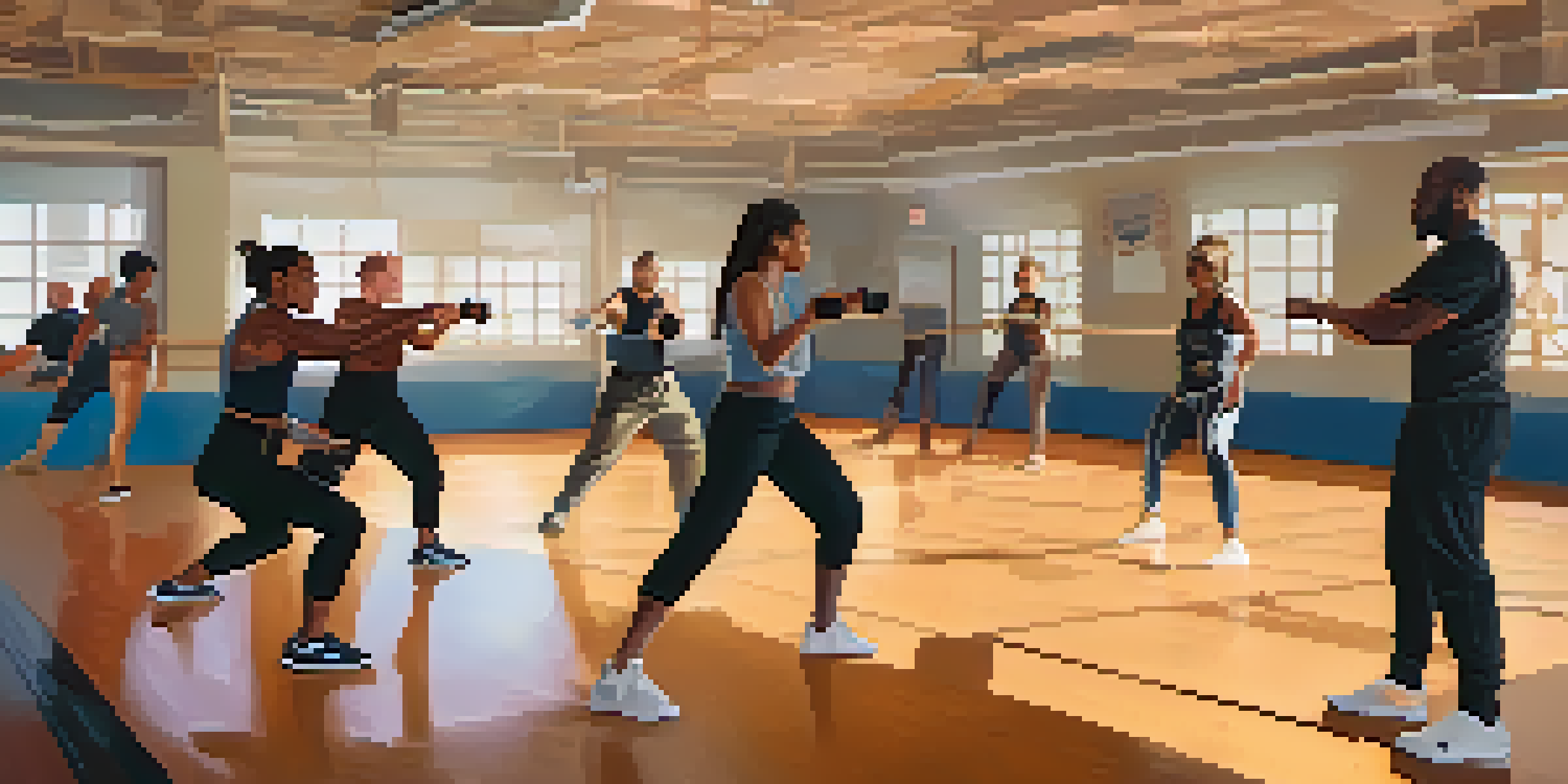Exploring Gender Identity's Impact on Self Defense Techniques

The Intersection of Gender Identity and Self-Defense
Gender identity plays a crucial role in how individuals approach self-defense. It shapes not only their experiences but also their perceptions of safety and threat. For example, a person who identifies as female may be more aware of societal expectations and potential vulnerabilities in various situations.
Self-defense is not just about physical techniques; it's about understanding your environment and your own identity.
Understanding this intersection is vital for tailoring self-defense techniques that resonate with different identities. A one-size-fits-all approach can overlook the unique challenges faced by individuals across the gender spectrum. By acknowledging these differences, self-defense programs can become more inclusive and effective.
Moreover, addressing gender identity in self-defense training helps foster a sense of empowerment. Participants feel more confident when they know their specific needs are recognized and addressed. This empowerment is essential for fostering a strong mindset that can deter potential threats.
Body Language and Gender Perception in Self-Defense
Body language is a powerful tool in self-defense, and it often varies by gender identity. For instance, research suggests that individuals who present as more traditionally masculine may exude confidence differently than those who identify as female or non-binary. This difference can influence how they are perceived in potentially dangerous situations.

Training that incorporates body language can help individuals understand how to project confidence and assertiveness. This can be particularly beneficial for those who might feel marginalized or less powerful due to societal stereotypes. Learning to command space can be a game-changer in self-defense scenarios.
Gender Identity Shapes Self-Defense
Understanding the link between gender identity and self-defense is crucial for creating inclusive and effective training programs.
Additionally, recognizing how body language is interpreted based on gender can enhance situational awareness. By being attuned to the reactions of others, individuals can better navigate potentially unsafe environments. This awareness is an essential skill in any self-defense toolkit.
Tailoring Techniques to Different Gender Identities
Self-defense techniques should be adapted to match the diverse experiences of individuals across gender identities. For instance, techniques that may be effective for someone who identifies as male might not be suitable for someone who identifies as female or non-binary. Tailoring these techniques ensures that everyone feels prepared and capable.
Empowerment through self-defense is about recognizing that everyone has the right to feel safe and secure in their own skin.
Incorporating various physical attributes and strengths is crucial for effective self-defense. For example, smaller individuals might benefit from techniques that focus on leverage and agility rather than brute strength. This means creating a curriculum that values adaptability and personal empowerment.
Moreover, engaging diverse instructors can enrich the learning experience. When students see themselves reflected in their trainers, it fosters a sense of belonging and trust. This inclusivity encourages participants to fully engage with the training process, enhancing their skills and confidence.
The Role of Community Support in Self-Defense Training
Community support is vital in self-defense training, particularly for marginalized gender identities. A supportive environment can help individuals feel safe to express their concerns and experiences. This sense of belonging can significantly impact their confidence and willingness to learn.
Group dynamics can also influence the learning process. When participants share similar experiences, they can foster deeper connections and understanding. This camaraderie not only enhances motivation but also allows for the sharing of strategies that might not be covered in traditional training.
Community Support Enhances Training
A supportive community fosters confidence and deeper connections among participants, making self-defense training more relevant and effective.
Additionally, community-led self-defense workshops can create a space for open dialogue about gender identity and safety. These discussions can illuminate unique challenges and strategies, making the training more relevant and effective. Ultimately, strong community ties can lead to more resilient individuals ready to defend themselves.
Psychological Aspects of Self-Defense Across Identities
The psychological aspects of self-defense are deeply intertwined with gender identity. Fear and anxiety can manifest differently based on an individual’s experiences and societal perceptions. For example, someone who identifies as transgender may face heightened anxiety in certain environments due to fear of discrimination or violence.
Training that addresses these psychological factors can help individuals develop mental resilience. Techniques such as visualization and mindfulness can be integrated to prepare participants for real-life scenarios. Building mental strength is just as important as physical techniques in self-defense training.
Furthermore, creating an open dialogue about these psychological challenges can normalize discussions around mental health. This approach encourages individuals to seek support and share their experiences, fostering a more comprehensive understanding of self-defense as a holistic practice.
Legal Considerations in Self-Defense for Different Identities
Understanding the legal implications of self-defense is crucial, especially for individuals from marginalized gender identities. Laws surrounding self-defense can vary significantly and may not always consider the unique experiences of these individuals. Consequently, education on legal rights and responsibilities is essential in self-defense training.
For instance, perceptions of threat can vary based on gender identity, affecting how the law interprets self-defense actions. Educating individuals about their rights can empower them to make informed decisions in high-stress situations. This knowledge can be a vital part of feeling secure and prepared.
Legal Awareness Empowers Individuals
Educating individuals about the legal implications of self-defense enhances their preparedness and confidence in high-stress situations.
Furthermore, discussions about legal considerations can help participants navigate post-incident scenarios. Knowing how to document events and seek legal support can make a significant difference in their recovery process. An informed approach to self-defense not only enhances personal safety but also promotes justice.
Empowerment Through Self-Defense and Gender Identity Awareness
Empowerment is at the heart of self-defense training, particularly when it incorporates an awareness of gender identity. Individuals who feel respected and understood in their training environment are more likely to embrace their strengths and capabilities. This empowerment can lead to increased confidence both in and out of self-defense scenarios.
Moreover, fostering an understanding of gender identity within self-defense classes can break down barriers and stereotypes. When participants engage with diverse perspectives, they learn to appreciate the richness of human experience. This appreciation can lead to greater empathy and community cohesion.

Ultimately, self-defense training that prioritizes gender identity awareness cultivates a culture of respect and empowerment. It encourages individuals to take charge of their safety while promoting inclusivity and understanding. This holistic approach not only prepares individuals physically but also enriches their personal growth journey.